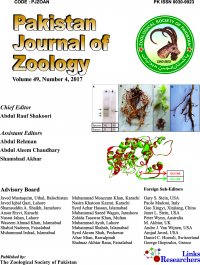1Freshwater Fisheries Research Institute of Shandong Province, Jinan 250013, China
2Qilu Children’s Hospital of Shandong University, Jinan 250022, China
0030-9923/2021/0004-1211 $ 9.00/0
Copyright 2021 Zoological Society of Pakistan
ABSTRACT
We evaluated the growth performance and the hepatoprotective and antioxidant effects of curcumin against carbon tetrachloride (CCl4)-induced liver injury in common carp Cyprinus carpio. A 10-week feeding trial was carried out. A basal feed was supplemented with 0 (control), 30, 60, 120 and 240 mg/kg curcumin to formulate five experimental feeds. At the end of the feeding trial, the growth performance was determined. Subsequently, CCl4 was used for the model experiment. The plasma and liver were collected for the test after 72 h. Results showed that there was a significant (P<0.05) increase in weight gain rate (WG) and a special growth rate (SGR) of fish fed feeds supplemented with 60 and 120 mg curcumin kg-1. When fish were induced by CCl4 after 72 h, fish fed the diet supplemented with 120 mg (P5) curcumin kg-1 had significantly (P<0.05) lower plasma GOT, GPT activities and MDA content and higher plasma TP content and activities of liver SOD, GSH, GSH-Px and plasma T-AOC than those of P1 group. Curcumin (120 mg kg-1 curcumin per feed) inhibited the damage of liver tissue structure caused by carbon tetrachloride and made liver tissue structure return to normal. Meanwhile, dietary curcumin supplementation could also increase the live Nrf2 mRNA level and Nrf2 protein level in the liver nucleus, and those of the P5 group were highest. Overall, the results indicated that appropriate dietary curcumin supplementation could enhance the growth (especially 60 and 120 mg kg-1 curcumin per feed) of common carp and effectively protect the liver against CCl4 induced injury (especially 120 mg kg-1 curcumin per feed) in fish.
To share on other social networks, click on any
share button. What are these?









